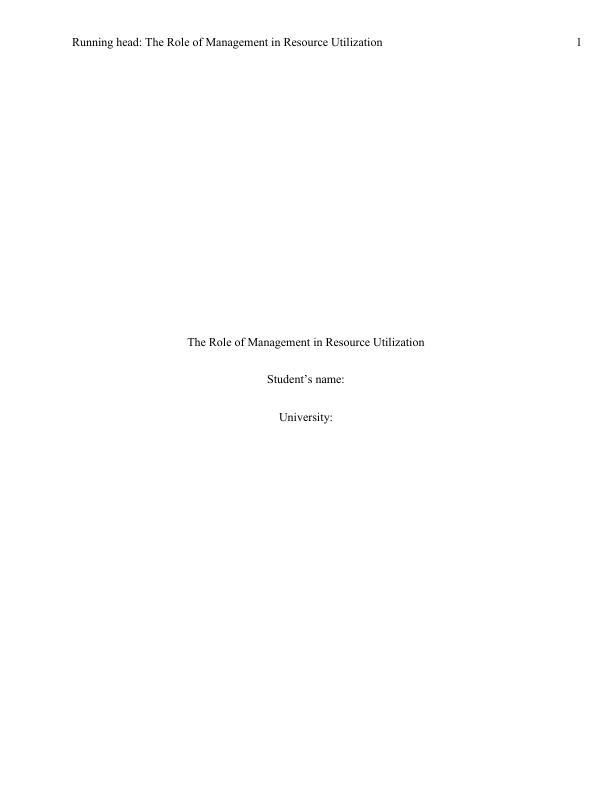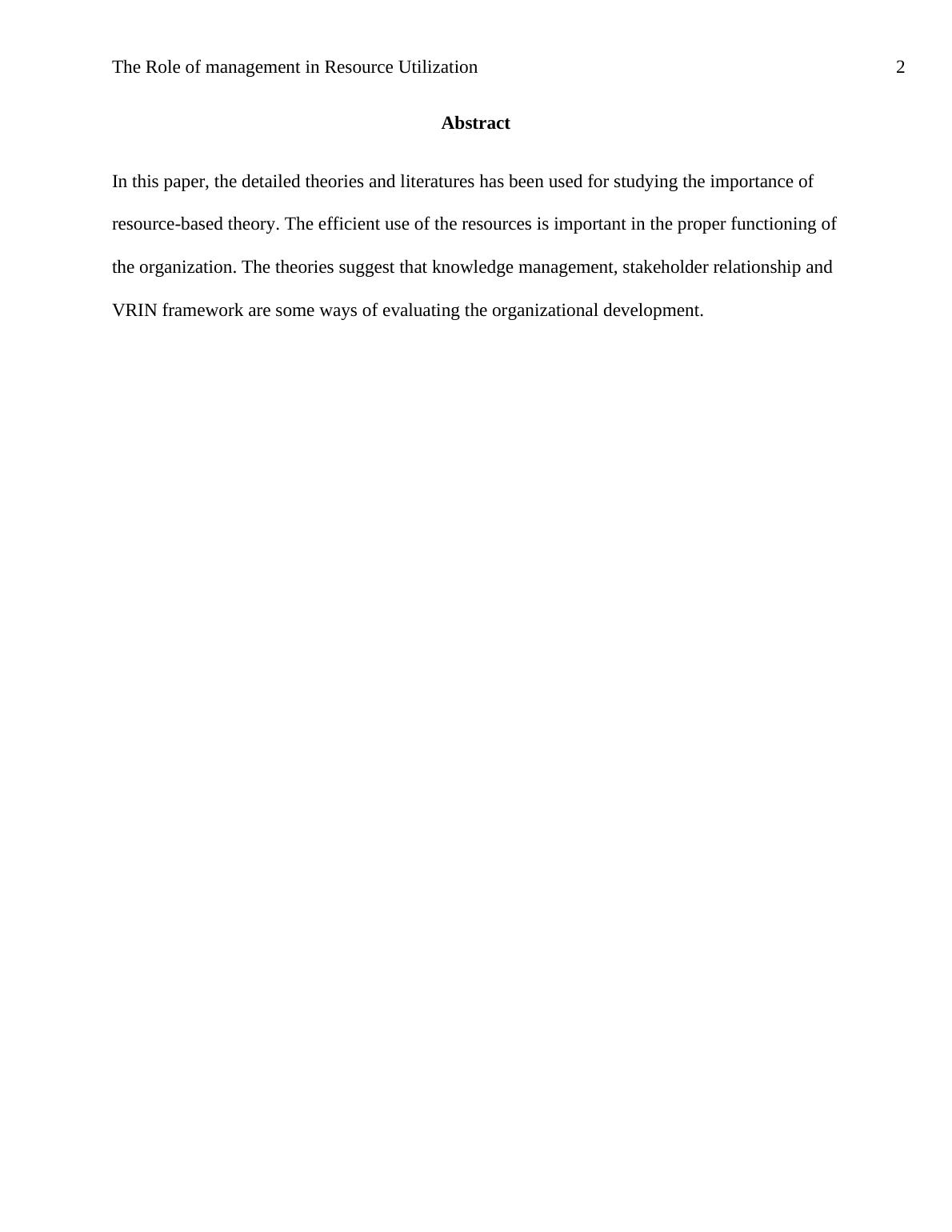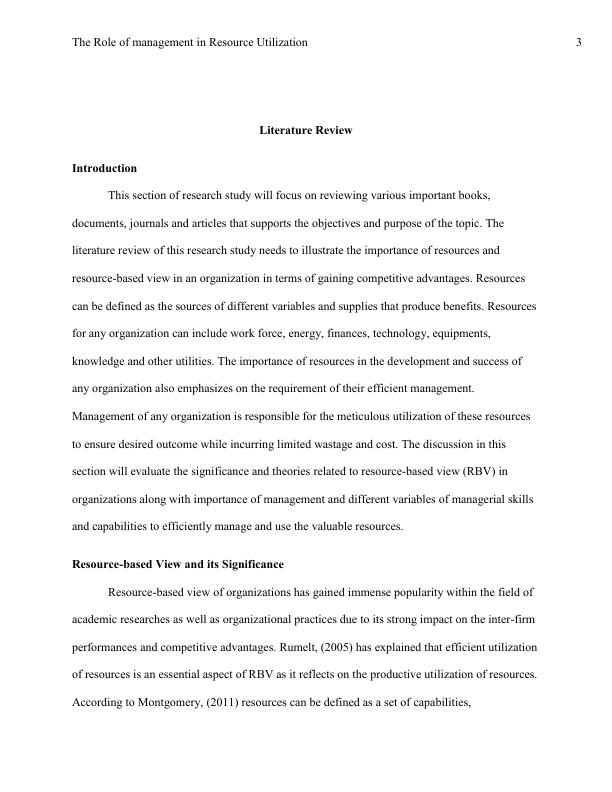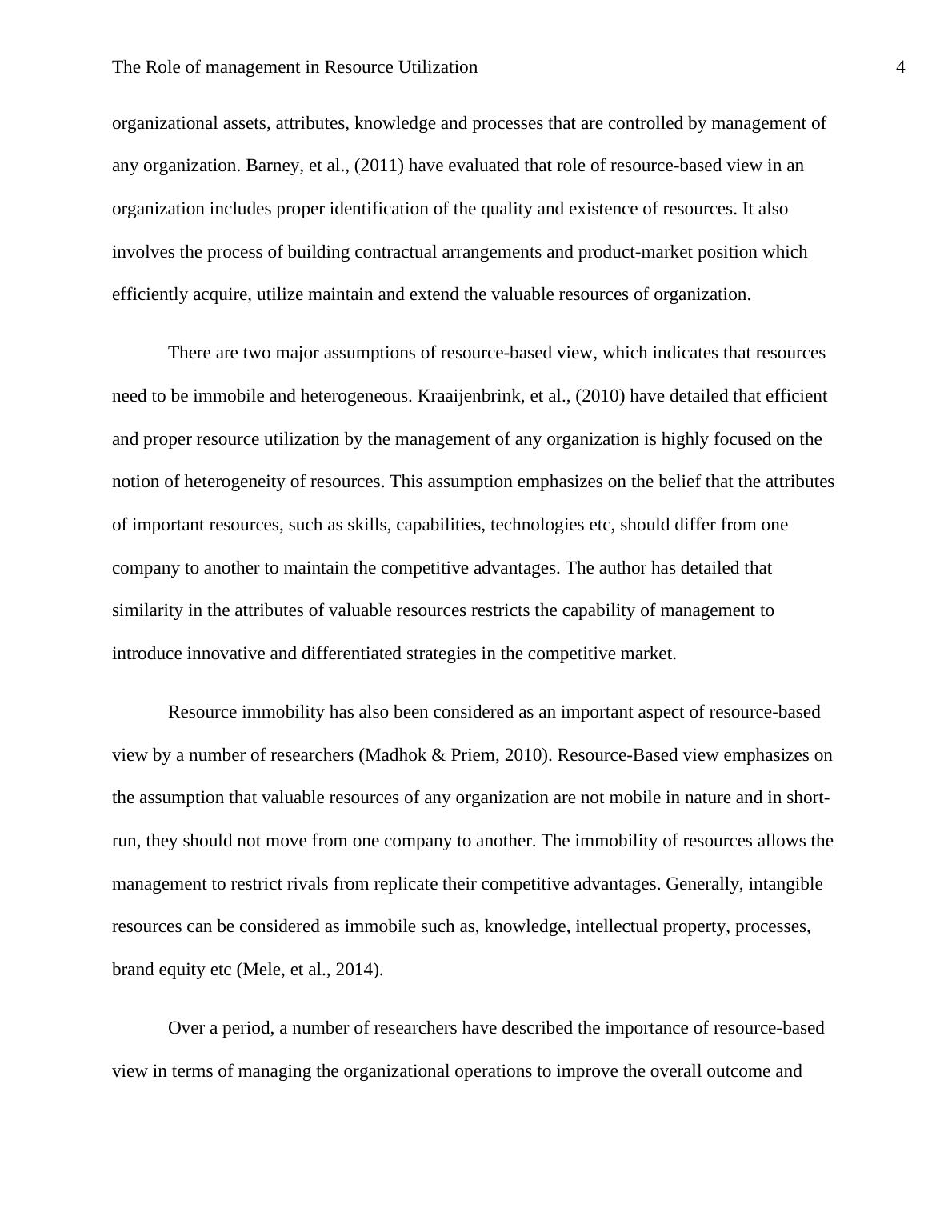Role of Management in Resource Utilization PDF
Added on 2022-01-19
14 Pages3003 Words75 Views
Running head: The Role of Management in Resource Utilization 1
The Role of Management in Resource Utilization
Student’s name:
University:
The Role of Management in Resource Utilization
Student’s name:
University:

The Role of management in Resource Utilization 2
Abstract
In this paper, the detailed theories and literatures has been used for studying the importance of
resource-based theory. The efficient use of the resources is important in the proper functioning of
the organization. The theories suggest that knowledge management, stakeholder relationship and
VRIN framework are some ways of evaluating the organizational development.
Abstract
In this paper, the detailed theories and literatures has been used for studying the importance of
resource-based theory. The efficient use of the resources is important in the proper functioning of
the organization. The theories suggest that knowledge management, stakeholder relationship and
VRIN framework are some ways of evaluating the organizational development.

The Role of management in Resource Utilization 3
Literature Review
Introduction
This section of research study will focus on reviewing various important books,
documents, journals and articles that supports the objectives and purpose of the topic. The
literature review of this research study needs to illustrate the importance of resources and
resource-based view in an organization in terms of gaining competitive advantages. Resources
can be defined as the sources of different variables and supplies that produce benefits. Resources
for any organization can include work force, energy, finances, technology, equipments,
knowledge and other utilities. The importance of resources in the development and success of
any organization also emphasizes on the requirement of their efficient management.
Management of any organization is responsible for the meticulous utilization of these resources
to ensure desired outcome while incurring limited wastage and cost. The discussion in this
section will evaluate the significance and theories related to resource-based view (RBV) in
organizations along with importance of management and different variables of managerial skills
and capabilities to efficiently manage and use the valuable resources.
Resource-based View and its Significance
Resource-based view of organizations has gained immense popularity within the field of
academic researches as well as organizational practices due to its strong impact on the inter-firm
performances and competitive advantages. Rumelt, (2005) has explained that efficient utilization
of resources is an essential aspect of RBV as it reflects on the productive utilization of resources.
According to Montgomery, (2011) resources can be defined as a set of capabilities,
Literature Review
Introduction
This section of research study will focus on reviewing various important books,
documents, journals and articles that supports the objectives and purpose of the topic. The
literature review of this research study needs to illustrate the importance of resources and
resource-based view in an organization in terms of gaining competitive advantages. Resources
can be defined as the sources of different variables and supplies that produce benefits. Resources
for any organization can include work force, energy, finances, technology, equipments,
knowledge and other utilities. The importance of resources in the development and success of
any organization also emphasizes on the requirement of their efficient management.
Management of any organization is responsible for the meticulous utilization of these resources
to ensure desired outcome while incurring limited wastage and cost. The discussion in this
section will evaluate the significance and theories related to resource-based view (RBV) in
organizations along with importance of management and different variables of managerial skills
and capabilities to efficiently manage and use the valuable resources.
Resource-based View and its Significance
Resource-based view of organizations has gained immense popularity within the field of
academic researches as well as organizational practices due to its strong impact on the inter-firm
performances and competitive advantages. Rumelt, (2005) has explained that efficient utilization
of resources is an essential aspect of RBV as it reflects on the productive utilization of resources.
According to Montgomery, (2011) resources can be defined as a set of capabilities,

The Role of management in Resource Utilization 4
organizational assets, attributes, knowledge and processes that are controlled by management of
any organization. Barney, et al., (2011) have evaluated that role of resource-based view in an
organization includes proper identification of the quality and existence of resources. It also
involves the process of building contractual arrangements and product-market position which
efficiently acquire, utilize maintain and extend the valuable resources of organization.
There are two major assumptions of resource-based view, which indicates that resources
need to be immobile and heterogeneous. Kraaijenbrink, et al., (2010) have detailed that efficient
and proper resource utilization by the management of any organization is highly focused on the
notion of heterogeneity of resources. This assumption emphasizes on the belief that the attributes
of important resources, such as skills, capabilities, technologies etc, should differ from one
company to another to maintain the competitive advantages. The author has detailed that
similarity in the attributes of valuable resources restricts the capability of management to
introduce innovative and differentiated strategies in the competitive market.
Resource immobility has also been considered as an important aspect of resource-based
view by a number of researchers (Madhok & Priem, 2010). Resource-Based view emphasizes on
the assumption that valuable resources of any organization are not mobile in nature and in short-
run, they should not move from one company to another. The immobility of resources allows the
management to restrict rivals from replicate their competitive advantages. Generally, intangible
resources can be considered as immobile such as, knowledge, intellectual property, processes,
brand equity etc (Mele, et al., 2014).
Over a period, a number of researchers have described the importance of resource-based
view in terms of managing the organizational operations to improve the overall outcome and
organizational assets, attributes, knowledge and processes that are controlled by management of
any organization. Barney, et al., (2011) have evaluated that role of resource-based view in an
organization includes proper identification of the quality and existence of resources. It also
involves the process of building contractual arrangements and product-market position which
efficiently acquire, utilize maintain and extend the valuable resources of organization.
There are two major assumptions of resource-based view, which indicates that resources
need to be immobile and heterogeneous. Kraaijenbrink, et al., (2010) have detailed that efficient
and proper resource utilization by the management of any organization is highly focused on the
notion of heterogeneity of resources. This assumption emphasizes on the belief that the attributes
of important resources, such as skills, capabilities, technologies etc, should differ from one
company to another to maintain the competitive advantages. The author has detailed that
similarity in the attributes of valuable resources restricts the capability of management to
introduce innovative and differentiated strategies in the competitive market.
Resource immobility has also been considered as an important aspect of resource-based
view by a number of researchers (Madhok & Priem, 2010). Resource-Based view emphasizes on
the assumption that valuable resources of any organization are not mobile in nature and in short-
run, they should not move from one company to another. The immobility of resources allows the
management to restrict rivals from replicate their competitive advantages. Generally, intangible
resources can be considered as immobile such as, knowledge, intellectual property, processes,
brand equity etc (Mele, et al., 2014).
Over a period, a number of researchers have described the importance of resource-based
view in terms of managing the organizational operations to improve the overall outcome and

End of preview
Want to access all the pages? Upload your documents or become a member.
Related Documents
Competitive Strategy: RBV, PESTLE Analysis and Porter Five Force Modelslg...
|8
|1839
|406
Managing Human Resourceslg...
|15
|3702
|43
Literature Review on Resource Based Viewlg...
|9
|2059
|131
Resource-Based View Issueslg...
|17
|4087
|92
Value of Informationlg...
|5
|1322
|69
Tools of Strategy Development: RBV, Generic Strategies and Ansofflg...
|11
|2097
|276
